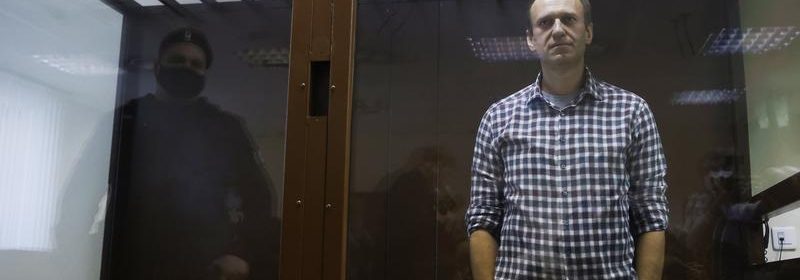Kremlin critic Navalny loses appeal against jail term

MOSCOW (Reuters) – Kremlin critic Alexei Navalny lost his appeal on Saturday against what he said was a politically motivated decision to jail him for nearly three years, but said his faith in God and belief in the rightness of his cause was sustaining him.
Navalny, President Vladimir Putin’s most prominent critic, was jailed earlier this month for parole violations that he said were trumped up. Western countries have condemned the case and are discussing possible sanctions on Russia.
A Moscow court swiftly rejected Navalny’s appeal on Saturday, while shortening his original jail term by six weeks. The original term was 3-1/2 years.
But with the amount of time he had already spent under house arrest taken into account, it amounted to around two years and eight months. His lawyer said on Saturday he would now spend a little over 2-1/2 years behind bars and that his legal team would try to challenge the decision to reject his appeal.
Navalny responded sarcastically to the ruling, which paves the way for him to be transferred from an infamous Moscow jail to a prison camp. “They’ve reduced the sentence by 1-1/2 months. Great!” he said from a courtroom glass cage.
Navalny’s allies reacted with anger.
“The court decision to keep Alexei in jail says only one thing. There is no law in Russia right now,” staff at Navalny’s Anti-Corruption Foundation, who investigate alleged official corruption, wrote on Twitter.
Navalny, 44, had earlier told the judge he was not guilty of parole violations as a previous court had found.
He returned to Russia last month from Germany, where he had been recovering from a near-fatal poisoning in Siberia in August with what many Western nations said was a nerve agent.
He said he had been unable to report to the Moscow prison service last year because he had been convalescing in Germany at the time.
“I don’t want to show off a lot, but the whole world knew where I was,” Navalny told the judge.
He said he had no regrets about returning to Russia, that his belief in God helped sustain him, and that “strength was in truth”.
“Our country is built on injustice. But tens of millions of people want the truth. And sooner or later they’ll get it.”
Latvian Foreign Minister Edgars Rinkevics said on Twitter the court’s ruling was at odds with a call by the European Court of Human Rights this week to free Navalny, and could lead to more sanctions against Moscow.
Asked to comment on Navalny’s political future after the court decision, Kremlin spokesman Dmitry Peskov told reporters, “It is absolutely none of our business”.
SLANDER CASE
Navalny appeared in court again later on Saturday for the culmination of a separate slander trial against him.
He is accused of defaming a World War Two veteran who took part in a promotional video backing constitutional reforms last year that let Putin run for two more terms in the Kremlin after 2024 if he wants.
Navalny described the people in the video as traitors and corrupt lackeys. But he has said his comments were not specifically directed against the veteran, and that the authorities are using the charge to smear his reputation.
State prosecutors have asked the court to fine Navalny 950,000 roubles ($12,800) for slander.
Navalny told the court the case was an attempt to distract people from tricky questions he had asked about the wealth of Putin and his allies and that state prosecutors were using the war veteran to get at him.
“You’ll burn in Hell for all of this,” he said.
The court is expected to announce its decision at 1500 GMT.
MORATORIUM ON BIG DEMONSTRATIONS
Navalny’s arrest and jailing sparked nationwide street protests in Russia, but his allies – most of whom are either under house arrest or abroad – have now declared a moratorium on major demonstrations until the spring.
Alexei Venediktov, one of Russia’s most prominent journalists, noted what he called a defeatist atmosphere within the opposition in the absence of immediate plans for street protests.
“We have seen the rejection of a mass (street protest) movement and a transition to candle-lit gatherings, and now absolutely nothing,” he said on Ekho Moskvy radio station.
Navalny accuses Putin of ordering his attempted murder. Putin has dismissed that, alleging Navalny is part of a U.S.-backed dirty tricks campaign to discredit him.
($1 = 73.9500 roubles)
Source: Read Full Article
